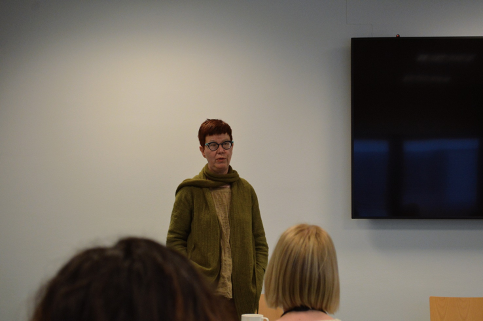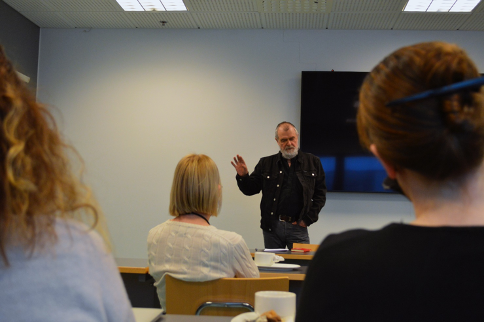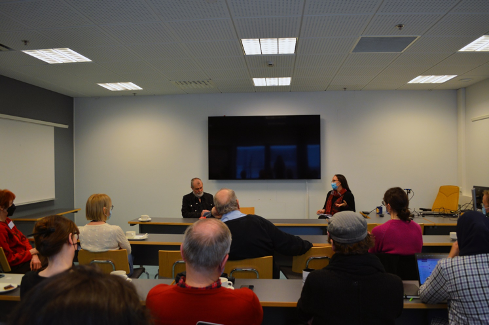In the opening remarks, the Research Director of TAPRI Tarja Väyrynen emphasized the importance of bringing various perspectives to the discussion, especially at a time when “we have witnessed how the Finnish media is limited as to who they want to talk to and listen to,” said Väyrynen pointing out that in media nowadays voices of soldiers/military and IR specialists are emphasized, while the perspectives of peace researchers remain limited.

By starting his speech, Jyrki Käkönen seconded the importance of discussion adding that “unfortunately discussion does not play any role anymore.”
Käkönen said transition and change in the international political order have been ongoing for already 20 years. Based on his observations and a book published in 2016 on the changing international order, he said that the war in Ukraine is a symptom of the changing international, political, and military order and that the rise of the Rest (referring to the concept of “the West and the Rest”) has changed the international order and is changing it constantly. He noted that the role of the US has been in decline and how China and India have been rising among some other developing countries. Positioning Russia in the ongoing transition of the international political order, Käkönen said:
“In this tradition, Russia has been on a losing side, as it has been failing in a sense that whatever it said did not matter anymore. And now, in Ukraine it can be said that in a dramatic way Russia has taken its place in global order back by using its military force telling the world, ‘We are still here, and you need to listen to us.’”
Käkönen pointed out that this is not a new approach in Russian politics drawing parallels with the surprise deployment of Russian troops in Pristina airport after the breakup of former Yugoslavia. “Even in those discussions, Russia was left outside, and it was not acceptable for Russia, therefore, it occupied Pristina airport by force saying, “You cannot leave us outside discussions”. And now it does the same again,” said Käkönen.

Transitioning to discussions on the war in Ukraine and its implications on the Finnish defense and security policies, Käkönen indicated that to understand does not mean to agree. “One can read the reality and understand it depending on what theoretical frameworks they use,” added Käkönen before commenting on the reality from his point of view.
The first aspect he referred to was answering to the question of what NATO is. Käkönen indicated that NATO is many things at the same time, PL. “but one thing is that NATO is to maintain security and US hegemony and the current international order, existing system, the so called ‘rule-based’ international order” he added. He then asked, “Whose order are we talking about?” In this line, he mentioned how the rest, first referring to China and India had been keen to change the order and change the rules, to get better benefits from the international order.”
Käkönen mentioned that it is difficult to support and accept the rule-based international order. “Rules are important, but if you take this order, since the end of the World War II, it is possible to say this order has caused suffering of hundreds of millions of people,” he said. For it to change, Käkönen stated that negotiations are needed, “but sadly, we have armed solutions and not negotiations on how it should be changed,” he then added.
Käkönen said that the majority of the world does not see the current international world order as a legitimate order.
Speaking of alternatives to the world order, Käkönen asked “how can we just sell our own values but not include others?” and whether it is possible to change the international order, so that it is not based on one hegemony but is multi-lateral.
To explain his point of view on Finland joining NATO, Käkönen relied on the Kantian perspective as his guiding principles, which he said suggest that military alliances construct and maintain contradictions and increase armament and arms race.
“In current situation if we compare, NATO’s defense budgets are three times bigger than China’s and Russia’s together. There is an imbalance. What from Russian perspective can be understood is that it is a threat to Russia,” Käkönen explained that the point is not if NATO ia or is not for aggression, but how Russia sees and views it. “It needs to be considered when talking about joining NATO,” Käkönen said, continuing that “the resources in armament, in Kantian perspective, are not available for constructing peaceful international order, peaceful meaning equal and just for everybody, or the majority at least.”

“If you want peace you have to construct peace in everyday practices. Armament provides security for states but not for people. Armament is not providing peace; it is preparing for next war. Security for people is different than for states,” said Käkönen.
Regarding the Parliament’s report, Käkönen stated that he has authored an article titled “Amateurs lead Finland into NATO,” which still has not been published. He explained this viewpoint by explaining how in the report the global aspect is missing. He stated that the importance of European Union being a security aspect for Finland is missing from the report. “The report says Finland must increase its military cooperation with USA, UK, Sweden and the Nordic countries. Surprisingly, it does not say anything on Germany or France, one of the most important countries in the Union, which somehow could give the nuclear weapon guarantee,” Käkönen added.
Explaining the international process, he said that what is important for the international actors now is to stop the war and go to peace negotiations, adding that no back door has remained open for Russia to back from its current position, so it does not lose its face somehow. “To me this is important in all kinds of conflict resolutions, so that the other side has a door remaining to back somehow,” Käkönen said.
In relation to nationwide public opinion polls recently conducted in Finland, he said “it is immoral to make these polls” drawing comparisons with an imaginary case with burning house and how at such circumstances, one would regret not having gotten an insurance. “It is understandable that people react this way,” he said adding that it is not fair at such situations to conclude that the majority of Finland wants to join NATO, which “is good for those who for a long time wanted Finland to get into NATO,” he said.
Speaking about relations between Finland and Russia, Käkönen mentioned that they have had successful relations with Russia in a long-term, asking “why wouldn’t we have it now?” He said, “I see we should continue the way we have done,” but today’s labeling of its as Finlandization and the attitude that the old policy is bad policy does not allow much space for the continuation of these relations. He viewed Finland’s previously gaining trust on Russian side, and at the same time taking small steps to integrate into Western Europe as a positive experience.
In light of the current political developments, the discussion ended with anguish mixed with promise, as Käkönen said:
“It feels like I have failed as a peace researcher, and I say sorry to my children that I have failed, and I cannot leave a peaceful world for you.”
The new generation of TAPRI peace researchers promised to continue the decades long tradition of peace research at TAPRI and not give up in search of peace despite all hindrances on the way.
